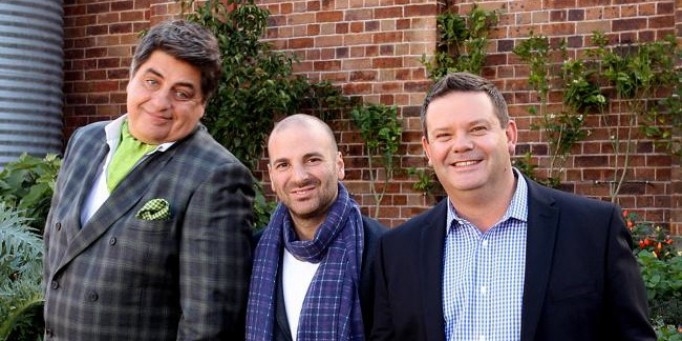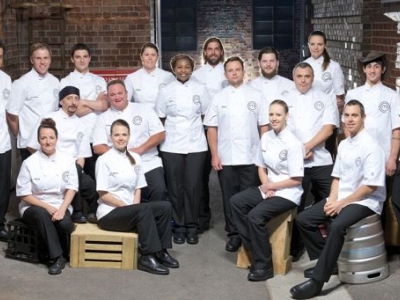
Masterchef: Season 5 Review
There have been some shake-ups in the new series, but the same spiritual problems remain.
The fifth season of Masterchef welcomes back restaurateur and chef Gary Mehigan, chef George Calombaris and food critic Matt Preston, the best known hosts of Australia’s best known TV cooking series.
In an effort to keep things fresh, the first episode opened with the news that there would be no televised selection rounds to kick off the competition. Instead, the show opened with 22 contestants pre-selected by the producers. In a further twist, the contestants were divided into two teams for a Men vs. Women cook-off that would last the whole week. Teams would be given the responsibility of cooking for the other side with a budget of only $204 – apparently the average grocery budget of an Australian family. There are also more theme weeks to follow, starting with ‘The Barossa’ and including topics like ‘Middle Eastern Cuisine’ and ‘Kids Week’. But of course the fundamentals don’t change. Every meal will be tested against the culinary trinity’s taste buds and a competitor will be ejected until the Masterchef for 2013 emerges.
In 2010 Masterchef made Australian television history, delivering more than 3.9 million viewers for its final show, the third highest result since ratings have been collected. However a mere three years later and there are new reality shows breathing down its neck. Last year Nine’s The Voice delivered a similarly staggering result with 3.2 million viewers for the final, while Masterchef had to be satisfied with 2.9 million. So are this year’s changes enough to recapture its crown?
It’s early days yet but, to be honest, it appears as though the decision to go with pre-chosen finalists has backfired. There are more interesting personalities and a wider mix of nationalities – as you’d expect – but the talent seems to be lacking. The first week at least the judges seemed more concerned with the passion of the contestants and their hunger to produce something that spoke of their home. Who can blame them? There were a couple of stand-out dishes but also a great deal of plain Australian cooking. And maybe that’s part of the problem associated with this genre…
This will not be the first time I draw attention to the unreal standards reality television programs apply. Cooking shows like Masterchef talk about ‘cooking from the heart’, but actually end up predisposing our hearts to being satisfied with less. The constant demands for better presentation, more imagination and continuing taste sensations are probably no great favour to whoever’s responsible for our nightly meals. But what the initial episodes have highlighted for me is a spiritual concern more subtle and significant than gluttony.
Prayer: the last resort for a desperate cook
Have you ever noticed the way that Masterchef deals with prayer? It pops up as a topic every now and then, in particular when the pressure is on. In the first week, we saw the men’s team desperately ‘praying’ their runny sour cream would firm up. Likewise the girls actually knelt down and prayed to their oven when it looked like their lemon tart wouldn’t set. And competitor Daniel Kelty’s attempt at Irish Mushy Peas elicited this response from Gary Mehigan:
“Kelty’s hoping to God or some higher power that it’ll just come together.”
Catch the common themes? Generally prayer is the last option in stressful situations. Also, rather than a sign of relationship, it’s the distress rocket you send up to someone you clearly don’t know. Finally, it’s not terribly rational – who bows down to an oven? – and expresses more a fervent feeling than a real request. In short it’s a world away from the style of prayers Jesus encouraged his followers to make:
“And when you pray, do not keep on babbling like pagans, for they think they will be heard because of their many words. Do not be like them, for your Father knows what you need before you ask him.”
The reason why we don’t babble nonsense or leave prayer to the last moment is because it’s based on a relationship. We pray as regularly as we’d speak to a loving Father, and we choose our words to reflect the trust we have in him. Now that might include praying over the preparation of a dinner that has to be on the table in under five minutes. However if sour cream is the only thing we think God is good for, then we have much bigger problems than a runny sauce.
Watching Masterchef with your kids
Masterchef is an easy watch for the family with a time-slot in sight of bedtime. If you’ve got ankle-biters watching the show, consider starting the following conversation:
- Does God care if the toast burns?
- What sort of things can you bring to our Heavenly Father?
- What are we learning when we talk to Him day by day?
For more articles from Growing Faith, subscribe to our monthly e-newsletter.
To hear about the latest books and resources from Youthworks Media, subscribe here.







